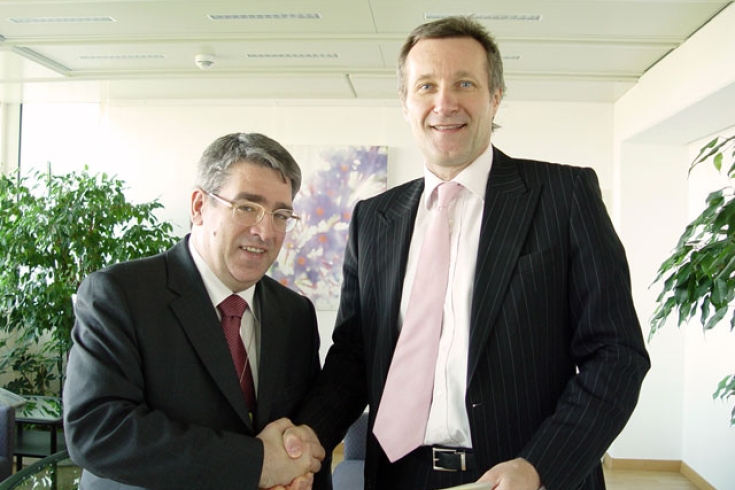The Comprehensive Nuclear-Test-Ban Treaty: A global response to today's global challenges

Ambassador Alexander Zmeyevskiy, Permanent Representative of the Russian Federation to the International Organizations in Vienna, and Tibor Tóth, CTBTO Executive Secretary
AS REGARDS THE FUTURE, THERE IS ABSOLUTELY NO DOUBT THAT IF THE DELAY IN THE ENTRY INTO FORCE OF THE CTBT CONTINUES FOR ANY LENGTHY PERIOD, THE NPT REGIME WILL BE SUBSTANTIALLY WEAKENED.
The Treaty on the Non-Proliferation of Nuclear Weapons and the CTBT: fundamental and complementary components of the non-proliferation regime
non-proliferation.
The Comprehensive Nuclear-Test-Ban Treaty — myths and reality
THE TREATY’S DETERRENT EFFECT IS ALREADY EVIDENT, EVEN THOUGH IT HAS NOT YET ENTERED INTO FORCE.
IT IS IMPORTANT TO UNDERSTAND CLEARLY THAT WITH THE HELP OF A LEGALLY ENFORCEABLE TREATY, IT IS MUCH EASIER TO MOBILIZE GLOBAL PUBLIC OPINION AGAINST NUCLEAR TESTING, WHATEVER THE MOTIVES COUNTRIES MAY HAVE IN CARRYING OUT SUCH TESTING.
The CTBT — one of the foreign policy priorities of the Russian Federation
THE RUSSIAN FEDERATION IS UNDERTAKING CONSISTENT EFFORTS TO FACILITATE THE EARLIEST POSSIBLE ENTRY INTO FORCE OF THE CTBT AND ENSURING THAT THE TREATY ACQUIRES UNIVERSAL STATUS. THIS IS INDEED ONE OF THE OBJECTIVES SET OUT IN THE FOREIGN POLICY CONCEPT OF THE RUSSIAN FEDERATION THAT WAS ADOPTED IN 2008.
Principled support for the CTBT is an integral part of Russian foreign policy that is aimed at strengthening international security and achieving strategic stability. The steps taken by the Russian Federation to ban nuclear testing are being reinforced by concrete measures in the area of disarmament. The agreement by the Russian Federation and the United States of America to replace the treaty between them on the reduction and limitation of strategic offensive arms is a major contribution to nuclear disarmament. In that regard, the Russian Federation considers that the achievement of such an ambitious objective as the full elimination of nuclear arms is possible only if the principle of equal security for all is observed and if viable key disarmament and non-proliferation instruments are in place, including the CTBT.
The contribution of the Russian Federation to the establishment of a mechanism for monitoring compliance with the CTBT
ACTIVITIES RELATING TO THE CTBT HAVE CLEARLY ACQUIRED A POSITIVE DYNAMIC IN RECENT TIMES. THIS TREND HAS EMERGED AGAINST THE BACKDROP OF CONDITIONS THAT ARE GENERALLY FAVOURABLE TO THE STRENGTHENING OF THE CURRENT INTERNATIONAL SECURITY ARCHITECTURE, OF WHICH THE CTBT SHOULD BE ONE OF THE KEY ELEMENTS.
The CTBT — today and tomorrow
IN THE PAST YEAR, A NUMBER OF CONCRETE STEPS HAVE BEEN TAKEN IN SUPPORT OF THE TREATY. ONE NOTABLE LANDMARK WAS THE ADOPTION OF SECURITY COUNCIL RESOLUTION 1887 (2009), WHICH CALLS ON ALL STATES TO SIGN AND/OR RATIFY THE CTBT AS SOON AS POSSIBLE.
Together, these developments provide the assurance that progress will continue to be made with respect to the Treaty.
It is sometimes said that the entry into force of the CTBT depends chiefly on the nuclear powers. Those States undeniably play a major role in the matter. However, it is important to understand, by following the Treaty to the letter, that the Treaty’s fate depends equally on all 44 of the Annex 2 States in and particularly on those that have yet to sign and ratify it. It is for that reason that the Russian Federation continues to appeal to those States to demonstrate serious political responsibility and take the necessary action as soon as possible.
The agenda for 2010 as regards non-proliferation and disarmament promises to be full and intensive. Important events that will leave their mark on history lie ahead. Of particular note among them is the NPT Review Conference, which is to examine the effectiveness of the NPT regime over the past five years and adopt a package of measures to strengthen the nuclear non-proliferation regime. The platform provided by this forum must be used in the most effective possible way to mobilize international efforts in support of the CTBT. It is important that the Treaty’s earliest possible entry into force be included among the issues to be addressed as a matter of urgency by the Review Conference.
Efforts to achieve the universalization of the Treaty must not slacken. Only universal adherence to the ban on nuclear testing can be a true guarantee of the irreversibility of that process. The Russian Federation continually emphasizes that point in its discussions with countries that have not yet signed and/or ratified the CTBT.
The new window of opportunity now available to the Treaty inspires full confidence. The international community stands at the crossroads of momentous decisions, and the historic opportunity that is presenting itself must not be missed.
19 Apr 2010
